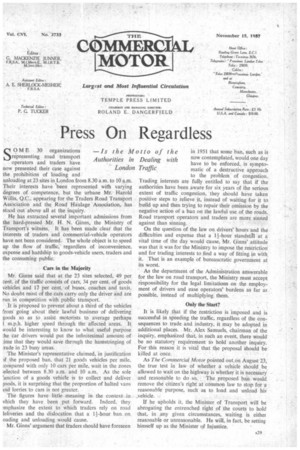Press On Regardless
Page 31

If you've noticed an error in this article please click here to report it so we can fix it.
—1's the Motto of the Authorities in Dealing with s London Traffic SrO E representing tnriazna st ipoonrst ° ronga operators and traders have now presented their case against the prohibition of loading and unloading at 23 sites in London from 8.30 a.m. to 10 a.m. Their interests have been represented with varying degrees of competence, but the urbane Mr. Harold Willis, Q.C., appearing for the Traders Road Transport Association and the Road Haulage Association, has stood out above all at the inquiry.
He has extracted several important admissions from the hard-pressed Mr. H. N. Ginns, the Ministry of Transport's witness. It has been made clear that the interests of traders and commercial-vehicle operators have not been considered. The whole object is to speed up the flow of traffic: regardless of inconvenience, expense and hardship to goods-vehicle users, traders and the consuming public.
Cars in the Majority Mr. Ginns said that at the 23 sites selected, 49 per cent. of the traffic consists of cars, 34 per cent. of goods vehicles and 17 per cent. of buses, coaches and taxis. No doubt most of the cars carry only the driver and are run in competition with public transport.
It is proposed to prevent about a third of the vehicles rroni going about their lawful business of delivering goods so as to assist motorists to average perhaps m.p.h. higher speed through the affected areas. It would be interesting to know to what useful purpose he car drivers would put the infinitesimal amount of ime that they would save through the hamstringing of :rade in 23 busy areas.
The Minister's representative claimed, in justification )f the proposed ban, that 21 goods vehicles per mile. .7.ornpared with only 10 cars per mile, wait in the zones ;elected between 8.30 a.m. and 10 a.m. As the sole 'unction of a goods vehicle is to collect and deliver ;oods, it is surprising that the proportion of halted vans Ind lorries to cars is not greater.
The figures have little meaning in the context in vhich they have been put forward. Indeed, they Inphasize the extent to which traders rely on road leliveries and the dislocation that a 11-hour ban on oading and unloading would cause.
• Mr. Ginns' argument that traders should have foreseen in 1951 that some ban, such as is now contemplated, would one day have to be enforced, is symptomatic of a destructive approach to the problem of congestion. Trading interests are fully entitled to' say that if the authorities have been aware for six years of the serious extent of traffic congestion, they should have taken positive steps to relieve it, instead of waiting for it to build up and then trying to repair their omission by the negative action of a ban on the lawful use of the roads. Road transport operators and traders are more sinned against than sinning.
On the question of the law on drivers' hours and the difficulties and expense that a 11-hour standstill at a vital time of the day would cause, Mr. Ginns' attitude was that it was for the Ministry, to impose the restriction' and for trading interests to find a way of fitting in with it. That is an example of bureaucratic government at its worst.
As the department of the Administration answerable for the law on road transport, the Ministry must accept responsibility for the legal limitations on the employment of drivers and ease operators' burdens as far as ' possible, instead of multiplying them.
Only the Start?
It is likely that if the restriction is imposed and is successful in speeding the traffic, regardless of the consequences to trade and industry, it may be adopted in additional places. Mr. Alex Samuels, chairman of the inquiry, emphasized that, in such an event, there would be no statutory requirement to hold another inquiry. For this reason it is vital that the proposal should be killed at once.
As The Commercial Motor pointed out.on August 23, the true test in law of whether a vehicle should be. allowed to wait on the highway is whether it is necessary and reasonable to do so. The proposed ban would remove the citizen's right at common law to stop for a reasonable purpose, such ah to load and unload his ,vehicle.
If he upholds it, the Minister of Transport will be abrogating the entrenched right of the courts to hold that, in any given circumstances, waiting is eithei reasonable or unreasonable. He will, in fact, be setting himself up as the Minister of Injustice.








































































































